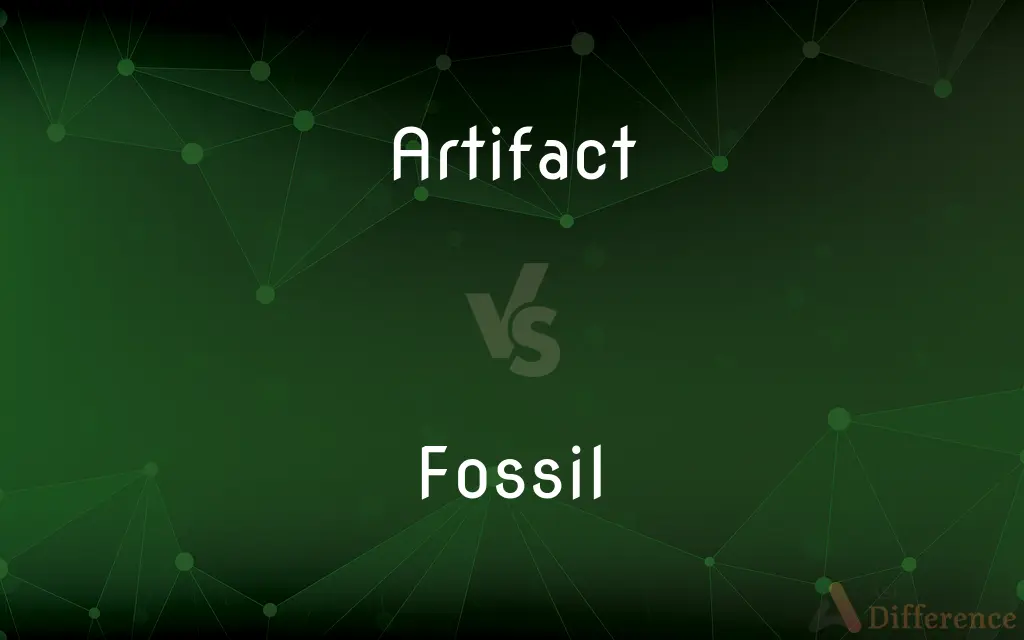Artifact vs. Fossil — What's the Difference?

Difference Between Artifact and Fossil
ADVERTISEMENT
Compare with Definitions
Artifact
An object produced or shaped by human craft, especially a tool, weapon, or ornament of archaeological or historical interest.
Fossil
A fossil (from Classical Latin: fossilis, literally 'obtained by digging') is any preserved remains, impression, or trace of any once-living thing from a past geological age. Examples include bones, shells, exoskeletons, stone imprints of animals or microbes, objects preserved in amber, hair, petrified wood, oil, coal, and DNA remnants.
Artifact
Something viewed as a product of human conception or agency rather than an inherent element
"Morality is an artifact of human culture, devised to help us negotiate social relations" (Michael Pollan).
Fossil
A remnant or trace of an organism of a past geologic age, such as a skeleton or leaf imprint, embedded and preserved in the earth's crust.
Artifact
A phenomenon or feature not originally present or expected and caused by an interfering external agent, action, or process, as an unwanted feature in a microscopic specimen after fixation, in a digitally reproduced image, or in a digital audio recording.
ADVERTISEMENT
Fossil
One that is outdated or antiquated
He was viewed as a fossil after decades in the same job.
Artifact
An inaccurate observation, effect, or result, especially one resulting from the technology used in scientific investigation or from experimental error
The apparent pattern in the data was an artifact of the collection method.
Fossil
A word or morpheme that is used only in certain restricted contexts, as kempt in unkempt, but is otherwise obsolete.
Artifact
An object made or shaped by human hand or labor.
Fossil
An archaic syntactic rule or pattern used only in idioms, as so be it.
Artifact
An object made or shaped by some agent or intelligence, not necessarily of direct human origin.
Fossil
Characteristic of or having the nature of a fossil.
Artifact
Something viewed as a product of human agency or conception rather than an inherent element.
Fossil
Being or similar to a fossil.
Artifact
A finding or structure in an experiment or investigation that is not a true feature of the object under observation, but is a result of external action, the test arrangement, or an experimental error.
The spot on his lung turned out to be an artifact of the X-ray process.
Fossil
Belonging to the past; antiquated.
Artifact
(archaeology) An object, such as a tool, ornament, or weapon of archaeological or historical interest, especially such an object found at an archaeological excavation.
The dig produced many Roman artifacts.
Fossil
The mineralized remains of an animal or plant.
Artifact
(biology) An appearance or structure in protoplasm due to death, the method of preparation of specimens, or the use of reagents, and not present during life.
Fossil
(paleontology) Any preserved evidence of ancient life, including shells, imprints, burrows, coprolites, and organically-produced chemicals.
Artifact
(computing) A perceptible distortion that appears in an audio or video file or a digital image as a result of applying a lossy compression or other inexact processing algorithm.
This JPEG image has been so highly compressed that it has unsightly artifacts, making it unsuitable for the cover of our magazine.
Fossil
(linguistics) A fossil word.
Artifact
(museology) Any object in the collection of a museum. May be used sensu stricto only for human-made objects, or may include ones that are not human-made.
Fossil
(figuratively) Anything extremely old, extinct, or outdated.
Artifact
A product of human workmanship; - applied esp. to the simpler products of aboriginal art as distinguished from natural objects.
Fossil
(figuratively) An extremely old or outdated person.
Artifact
Any product of human workmanship; - applied both to objects made for practical purposes as well as works of art. It is contrasted to natural object, i.e. anything produced by natural forces without the intervention of man.
Fossil
Dug out of the earth; as, fossil coal; fossil salt.
Artifact
A structure or appearance in protoplasm due to death, method of preparation of specimens, or the use of reagents, and not present during life.
Fossil
Preserved from a previous geological age; as, fossil water from deep wells; - usually implying that the object so described has had its substance modified by long residence in the ground, but also used (as with fossil water) in cases where chemical composition is not altered.
Artifact
An object, oservation, phenomenon, or result arising from hidden or unexpected causes extraneous to the subject of a study, and therefore spurious and having potential to lead one to an erroneous conclusion, or to invalidate the study. In experimental science, artifacts may arise due to inadvertant contamination of equipment, faulty experimental design or faulty analysis, or unexpected effects of agencies not known to affect the system under study.
Fossil
Like or pertaining to fossils; contained in rocks, whether petrified or not; as, fossil plants, shells.
Artifact
A man-made object taken as a whole
Fossil
A substance dug from the earth.
Fossil
The remains of an animal or plant found in stratified rocks. Most fossils belong to extinct species, but many of the later ones belong to species still living.
Fossil
A person whose views and opinions are extremely antiquated; one whose sympathies are with a former time rather than with the present.
Fossil
Someone whose style is out of fashion
Fossil
The remains (or an impression) of a plant or animal that existed in a past geological age and that has been excavated from the soil
Fossil
Characteristic of a fossil
Share Your Discovery

Previous Comparison
Assessment vs. Evaluation
Next Comparison
Shoreline vs. Coastline














































